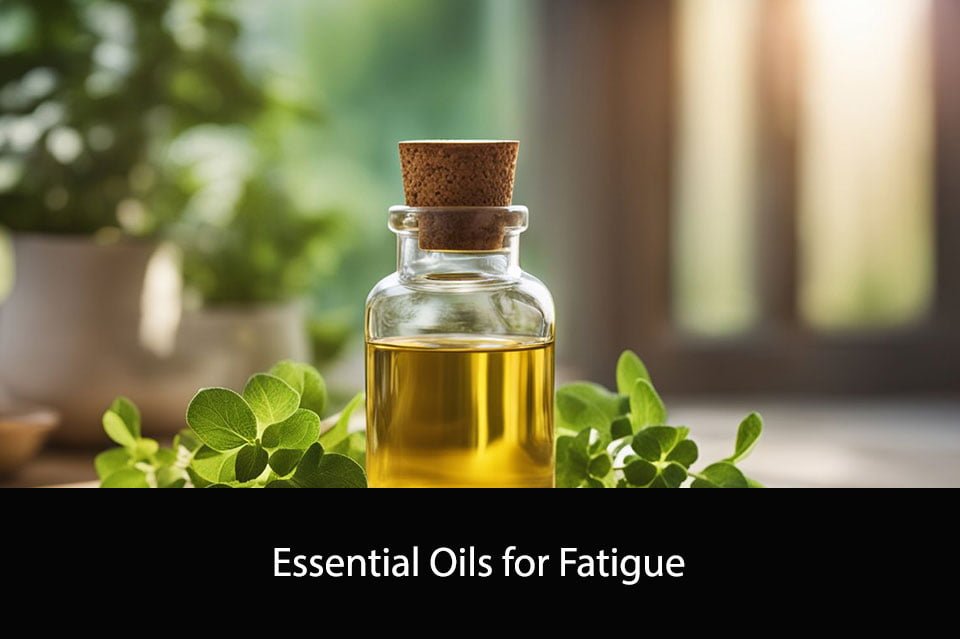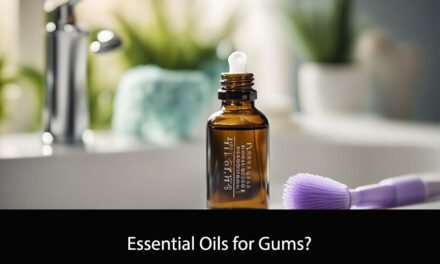Essential oils have been used for centuries for their therapeutic properties. They are extracted from plants and contain the natural essence and aroma of the plant. Essential oils are known to have a variety of benefits, including reducing stress, promoting relaxation, and improving energy levels. In this article, we will focus on essential oils for fatigue and how they can help boost energy and fight exhaustion.
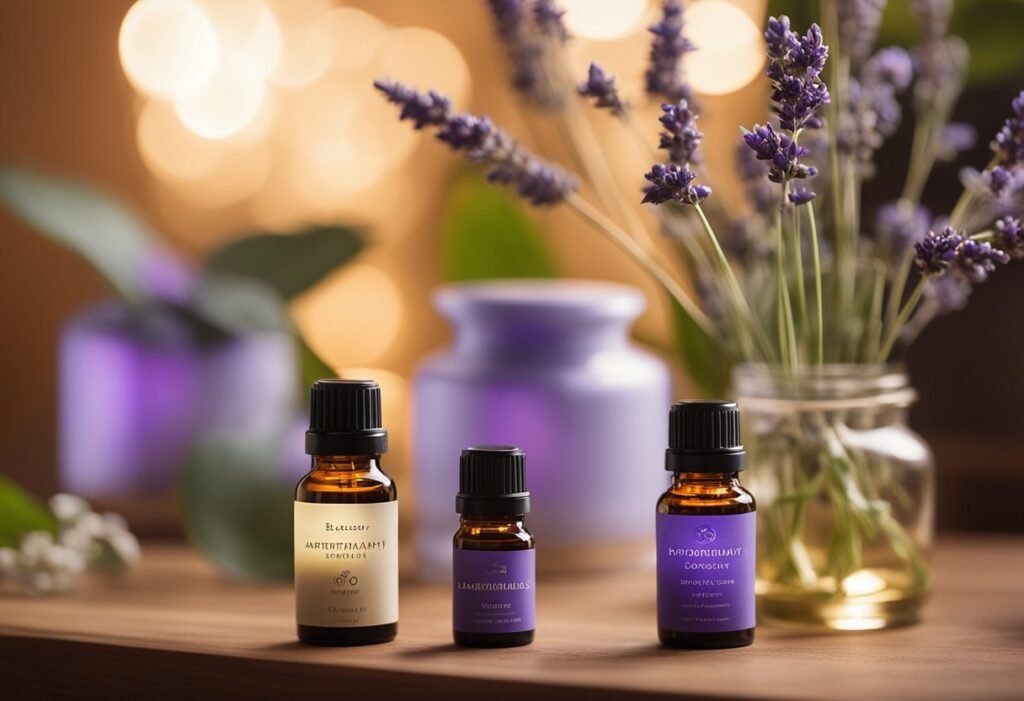
Fatigue is a common problem that affects many people. It can be caused by a variety of factors, including lack of sleep, poor diet, stress, and medical conditions. When we are fatigued, we feel tired, weak, and lack motivation. Essential oils can be a natural and effective way to combat fatigue and increase energy levels. In the following paragraphs, we will explore some of the best essential oils for fatigue and how to use them.
Understanding Fatigue

Fatigue is a common condition that affects many people at some point in their lives. It is characterized by a feeling of tiredness, weakness, and lack of energy, which can be physical, mental, or both. In this section, we will discuss the causes of fatigue and the effects it can have on our health.
Causes of Fatigue
There are many different factors that can contribute to fatigue. Some of the most common causes include:
- Lack of sleep: Not getting enough sleep can leave us feeling tired and drained, making it difficult to focus and perform daily tasks.
- Poor diet: A diet that is high in sugar, processed foods, and unhealthy fats can leave us feeling sluggish and fatigued.
- Stress: Chronic stress can take a toll on our physical and mental health, leading to fatigue and other symptoms.
- Medical conditions: Certain medical conditions, such as anemia, thyroid problems, and chronic fatigue syndrome, can cause fatigue.
Effects of Fatigue on Health
Fatigue can have a number of negative effects on our health and wellbeing. For example:
- Reduced productivity: When we are tired and lacking energy, it can be difficult to focus and get things done, which can impact our work and personal lives.
- Increased risk of accidents: Fatigue can impair our ability to think clearly and react quickly, which can increase our risk of accidents while driving, operating machinery, or performing other tasks.
- Poor mental health: Chronic fatigue can lead to depression, anxiety, and other mental health issues.
- Weakened immune system: Lack of sleep and chronic stress can weaken our immune system, making us more susceptible to illness.
In summary, fatigue is a common condition that can have significant impacts on our health and wellbeing. By understanding the causes and effects of fatigue, we can take steps to manage it and improve our overall quality of life.
Basics of Essential Oils
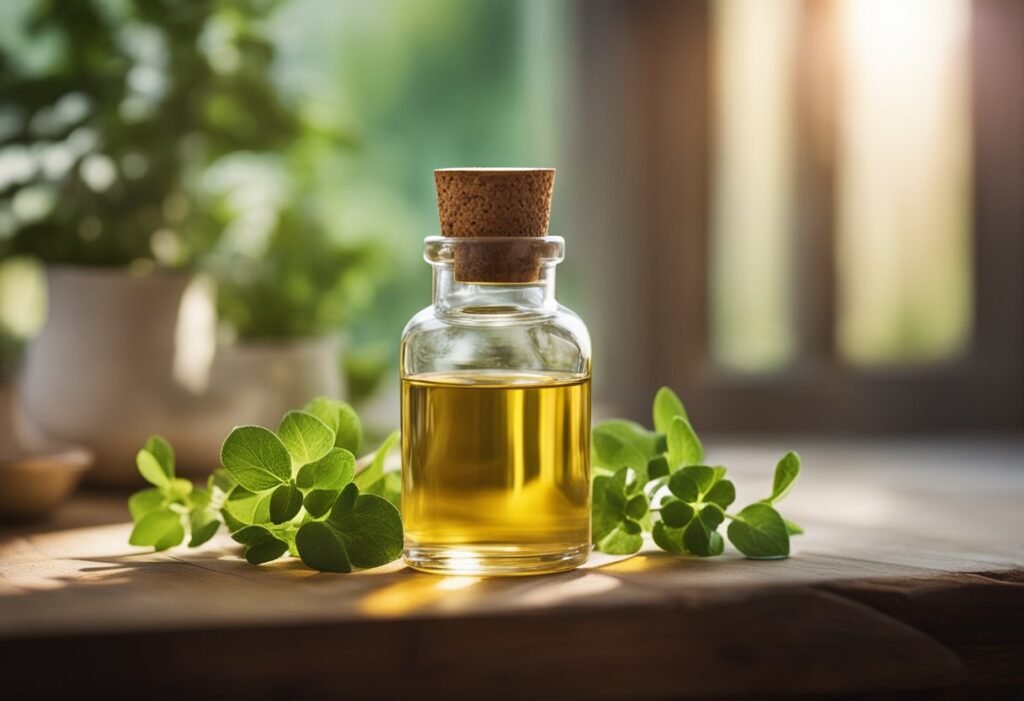
What Are Essential Oils?
Essential oils are highly concentrated plant extracts that capture the plant’s scent and flavor. They are extracted through distillation or cold pressing, and are composed of volatile organic compounds that make up their unique aroma and therapeutic properties.
Essential oils are not the same as fragrance oils or perfumes, which are synthetic and do not contain the same therapeutic benefits. Essential oils are natural and contain the plant’s active compounds that have been used for centuries for their medicinal properties.
How Essential Oils Work
Essential oils work through inhalation, topical application, or ingestion. When inhaled, the aroma molecules stimulate the olfactory system and send signals to the brain, affecting mood, emotions, and memory.
When applied topically, essential oils penetrate the skin and enter the bloodstream, where they can provide localized or systemic effects. Some essential oils have anti-inflammatory, antifungal, or antibacterial properties, while others can help relax muscles, reduce pain, or improve circulation.
It’s important to note that essential oils should always be used with caution and diluted properly before use. Some essential oils can cause skin irritation or allergic reactions, and others can be toxic if ingested in large amounts. It’s recommended to consult with a qualified aromatherapist or healthcare provider before using essential oils for any health condition.
Best Essential Oils for Fatigue
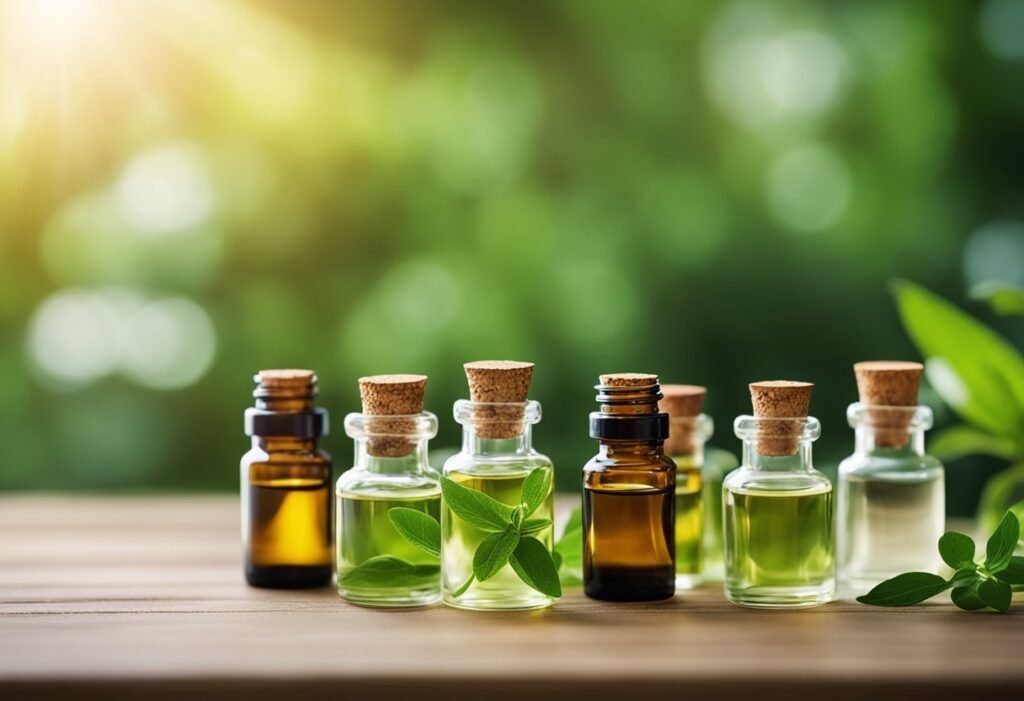
When it comes to combating fatigue, essential oils can be a natural and effective solution. Here are some of the best essential oils for fatigue:
Peppermint Oil
Peppermint oil has a refreshing and invigorating scent that can help to stimulate the mind and combat fatigue. It can also help to relieve headaches and improve mental clarity. To use peppermint oil for fatigue, try adding a few drops to a diffuser or inhaling directly from the bottle.
Lemon Oil
Lemon oil has a bright and uplifting scent that can help to boost energy levels and improve mood. It can also help to improve mental focus and concentration. To use lemon oil for fatigue, try adding a few drops to a diffuser or mixing with a carrier oil and applying to the temples or wrists.
Eucalyptus Oil
Eucalyptus oil has a cooling and refreshing scent that can help to reduce fatigue and improve mental clarity. It can also help to relieve respiratory issues and promote relaxation. To use eucalyptus oil for fatigue, try adding a few drops to a diffuser or mixing with a carrier oil and applying to the chest or back.
Rosemary Oil
Rosemary oil has a stimulating and invigorating scent that can help to combat fatigue and improve mental focus. It can also help to relieve headaches and promote relaxation. To use rosemary oil for fatigue, try adding a few drops to a diffuser or mixing with a carrier oil and applying to the temples or neck.
By incorporating these essential oils into your daily routine, you can help to combat fatigue and improve your overall well-being.
Application Methods
When it comes to using essential oils for fatigue, there are several application methods to choose from. Each method has its own benefits, so it’s important to choose the one that works best for you. In this section, we’ll discuss the three most popular application methods: topical application, inhalation techniques, and aromatherapy diffusers.
Topical Application
Topical application is one of the most popular ways to use essential oils. This method involves applying the oil directly to the skin. When using this method, it’s important to dilute the oil with a carrier oil to avoid skin irritation. Some popular carrier oils include coconut oil, jojoba oil, and almond oil.
To apply the oil, simply mix a few drops of the essential oil with the carrier oil and massage it into the skin. This method is great for targeting specific areas of the body, such as the temples, neck, or wrists. Some popular essential oils for fatigue that can be used topically include peppermint, lavender, and eucalyptus.
Inhalation Techniques
Inhalation techniques involve breathing in the scent of the essential oil. This method is great for those who want to experience the benefits of the oil without applying it directly to the skin. There are several ways to inhale essential oils, including:
- Adding a few drops of the oil to a bowl of hot water and inhaling the steam
- Adding a few drops of the oil to a diffuser and inhaling the scent
- Adding a few drops of the oil to a tissue and inhaling the scent
Some popular essential oils for fatigue that can be used for inhalation techniques include lemon, rosemary, and grapefruit.
Aromatherapy Diffusers
Aromatherapy diffusers are a popular way to use essential oils. These devices release the scent of the oil into the air, allowing you to breathe it in. There are several types of diffusers available, including ultrasonic diffusers, nebulizing diffusers, and evaporative diffusers.
To use a diffuser, simply add a few drops of the essential oil to the water or oil in the device. Turn on the diffuser and enjoy the scent. Some popular essential oils for fatigue that can be used in diffusers include peppermint, lemon, and lavender.
In conclusion, there are several ways to use essential oils for fatigue. Whether you choose to apply the oil topically, inhale it, or use a diffuser, it’s important to choose the method that works best for you. By incorporating essential oils into your daily routine, you can help fight fatigue and improve your overall well-being.
Safety and Precautions
When using essential oils for fatigue, it is important to take certain safety precautions to avoid adverse effects. Here are some guidelines to follow:
Dilution Guidelines
Essential oils are highly concentrated and should always be diluted before use. The recommended dilution ratio is typically 1-2 drops of essential oil per teaspoon of carrier oil. Carrier oils such as coconut oil, almond oil, or jojoba oil can help to dilute the essential oil and prevent skin irritation.
Possible Side Effects
Although essential oils are generally safe when used properly, some people may experience side effects. These can include skin irritation, allergic reactions, headaches, and nausea. To avoid these side effects, it is important to use high-quality, pure essential oils and to follow the recommended dilution guidelines.
Interactions and Contraindications
Essential oils can interact with certain medications or medical conditions, so it is important to consult with a healthcare professional before using essential oils for fatigue. Some essential oils may also be contraindicated for pregnant or breastfeeding women, children, or individuals with certain medical conditions.
By following these safety precautions, you can safely and effectively use essential oils for fatigue.
Integrating Essential Oils into Your Routine
When it comes to using essential oils for fatigue, incorporating them into your daily routine can be an effective way to boost energy levels and combat feelings of tiredness. Here are some ways to integrate essential oils into your routine:
Daily Practices for Energy
One way to use essential oils for fatigue is to incorporate them into your daily practices. For example, you can add a few drops of peppermint oil to your morning shower to invigorate your senses and help you feel more awake. Alternatively, you can diffuse citrus oils like lemon or grapefruit throughout the day to promote a sense of alertness and focus.
Another way to use essential oils for energy is to apply them topically. For example, you can mix a few drops of peppermint oil with a carrier oil like coconut oil and apply it to your temples and the back of your neck for a refreshing and energizing sensation.
Creating a Restful Environment
While essential oils can be great for boosting energy levels, they can also be used to create a restful environment that promotes relaxation and restful sleep. Some essential oils that are known for their calming properties include lavender, chamomile, and ylang-ylang. You can diffuse these oils in your bedroom before bed, or add a few drops to a warm bath to help you unwind.
In addition to using essential oils, there are other things you can do to create a restful environment. For example, you can make sure your bedroom is cool, dark, and quiet, and avoid using electronics before bed. You can also establish a relaxing bedtime routine that includes activities like reading or taking a warm bath.
By integrating essential oils into your routine and creating a restful environment, you can combat fatigue and promote feelings of alertness and relaxation.
Complementary Therapies
When it comes to combating fatigue, essential oils can be a valuable tool. However, they are not the only option. Complementary therapies can be used alongside essential oils to provide a more comprehensive approach to fighting fatigue. Here are a few complementary therapies to consider:
Hydration and Nutrition
Staying hydrated and eating a nutritious diet can go a long way in reducing fatigue. Dehydration can cause fatigue, so it is important to drink plenty of water throughout the day. Additionally, a diet rich in fruits, vegetables, whole grains, and lean proteins can provide the energy and nutrients your body needs to combat fatigue.
Exercise and Rest
Regular exercise can help reduce fatigue by improving circulation and increasing energy levels. It doesn’t have to be anything intense – even a short walk can make a difference. On the other hand, rest is also important. Getting enough sleep at night and taking breaks throughout the day can help prevent burnout and keep fatigue at bay.
By incorporating these complementary therapies into your routine alongside essential oils, you can create a holistic approach to combating fatigue.
Frequently Asked Questions
Which essential oils are recommended for improving focus and productivity?
Peppermint, rosemary, and lemon essential oils are known for their ability to improve focus and productivity. These oils can be diffused, inhaled directly, or applied topically to the skin after being diluted with a carrier oil.
How can essential oils be used to enhance energy levels?
Essential oils such as grapefruit, bergamot, and eucalyptus can be used to enhance energy levels. These oils can be diffused, inhaled directly, or added to a warm bath to help promote feelings of energy and alertness.
What are the best essential oils to alleviate symptoms of chronic fatigue?
Lavender, peppermint, and lemon essential oils are known for their ability to alleviate symptoms of chronic fatigue. These oils can be diffused, inhaled directly, or applied topically to the skin after being diluted with a carrier oil.
Which uplifting essential oils are effective for managing depression?
Bergamot, ylang-ylang, and frankincense essential oils are known for their uplifting properties and can be effective for managing depression. These oils can be diffused, inhaled directly, or applied topically to the skin after being diluted with a carrier oil.
How can essential oils contribute to a feeling of happiness and increased energy?
Essential oils can contribute to a feeling of happiness and increased energy by promoting feelings of relaxation and reducing stress. Oils such as lavender, chamomile, and bergamot can be diffused, inhaled directly, or added to a warm bath to promote feelings of happiness and relaxation.
Are there specific essential oils that are known to help with attention and energy in ADHD?
Essential oils such as vetiver, cedarwood, and lavender are known to help with attention and energy in ADHD. These oils can be diffused, inhaled directly, or applied topically to the skin after being diluted with a carrier oil. However, it is important to note that essential oils should not be used as a substitute for medical treatment.

